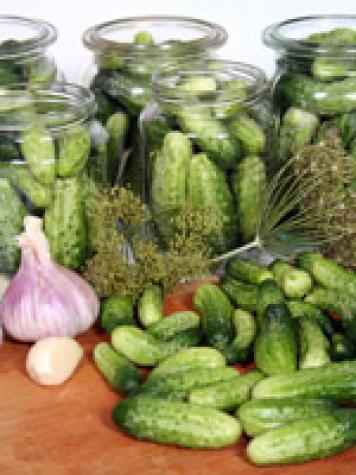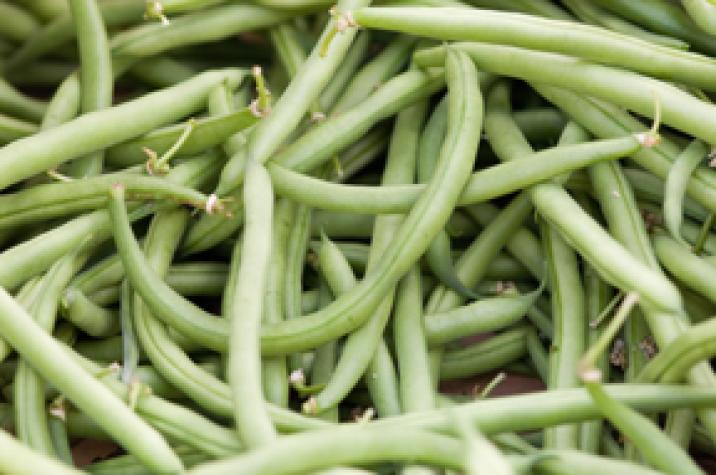
Pick a peck of peppers this summer
Peppers come in a variety of colors, shapes, sizes and flavors ranging from sweet to spicy hot. They are a colorful addition to any meal, or they can be enjoyed as a snack on their own.
Brussels sprouts can be a nutritious treat
Brussels sprouts, the green cruciferous vegetables sometimes referred to by children as “cannon balls,” are not typically a favorite from the vegetable group. But when they are selected well, eaten soon after they are picked and cooked properly, they can be a nutritious treat.
Make a mystery meal into a culinary delight
It’s time to eat. You open the fridge and find some brown rice, a small piece of meat and some leftover vegetables. How can this possibly become a meal? Here are some tips on converting a mystery meal of leftovers into a culinary delight.
Helping children develop good health habits
Parents play an important role in helping their children develop good health habits. Healthy children eat well, live a physically active life and feel good about themselves and others.
Back-to-school nutrition
With the new school year upon us, parents should be reminded of the important role nutrition plays in assuring kids a successful school year. Nutrition and learning go hand in hand.
Healthy habits for your preschool-aged child
Preschool is a good time to help your child develop good eating habits. Because your child is with you most of the time, it is easier to influence their food choices. Keep in mind that the eating habits learned during this time can be carried into the future.
Good nutrition can be a tough sell to finicky eaters
The picky food preferences of children can make even the best of parents struggle to ensure their child eats right and to keep mealtimes from being a battle.
Feed your young athlete for maximum performance
Discover nutrition tips to fuel young athletes for energy, focus, and peak performance on and off the field.
Everyone benefits from family meals
Following more than 10 years of research, The National Center on Addiction and Substance Abuse (CASA) at Columbia University consistently found that kids who eat dinner with their families are less likely to smoke, drink or use drugs.
Choose a pressure canner to safely preserve foods
With each year’s growing season, there seems to be another round of “new and improved” kitchen gadgets to make preserving the harvest easier and better. Some can be a great help; others, like the electric multi-cooker appliances, may not result in the safe canned product one might be expecting.
Issues with canning on ceramic or glass stovetops
A common question about canning foods is, “Is it OK to can on my ceramic or glass stovetop?”First, check the recommendations of the particular stove’s manufacturer. Some say absolutely not, while others say it is OK, but with certain stipulations.
Get ready for home canning season
When you plant your garden, it’s so easy to imagine all of the great tasting, healthy food that will come from those tiny seeds and plants. Many people grow not only enough to eat during the summer but enough so they can preserve those garden delights for cold winter nights. Spring is a great time to make sure your canning gear is ready for production when your garden starts producing more than you can eat.
Packing perfect pickles
It can be very rewarding to serve your family and guests your very own homemade pickles. Whether you are a novice or experienced pickle maker there are things to keep in mind when making your pickled products. Below are several questions that we have received at the Extension office with the correct answers:
Blanch vegetables before freezing
Every fresh sweet corn season I hear people telling others to preserve their corn by just putting it in the freezer. Unless you are freezing onions or green peppers, blanching is a must before freezing vegetables.
Making fruit leather
A great way to preserve extra fruit or fruit with bumps, bruises or knots is to make fruit leather. The National Center for Home Food Preservation at University of Georgia Cooperative Extension has helpful directions for making fruit leather:

Pack a perfect pickle
Pickling is a different way to enjoy cucumbers and is often an easy process, but there are some important things to know to assure pickles are safe to eat. The main ingredients used for pickling are acid, salt, sugar and spices. Lime and alum are also sometimes used to make crisper pickles.
Preserving fruit salsas
Tomato-based salsas have been popular for years for food preservers, but there is a new twist on this favorite — fruit salsas. “Most fruit salsas are preserved to be used with meats, poultry and fish,” said Susan Mills-Gray, nutrition/health specialist with MU Extension. “The fruit, herbs and heat of onion or pepper, as well as the vibrant colors adds zest to meals.”

Many ways to preserve garden green beans
Explore safe methods to preserve green beans through canning, freezing, drying, or pickling, ensuring year-round enjoyment.
Get the best results when freezing your produce
Many people enjoy planting gardens and eating fresh, homegrown produce in the summer. For people who want to preserve their garden vegetables and eat them another time, freezing is a viable option. The color, flavor and texture of the produce is often maintained when it is frozen, and the freezing process is easy and less time consuming than canning.
Prevent botulism from home-canned foods
Microorganisms all around us can cause food spoilage — they are in the air and soil, and on people and animals. Many microorganisms are difficult to get rid of, including Clostridium botulinum — the bacteria that causes botulism. Botulism is rare but can be fatal. Home-processed foods are often the culprit of foodborne botulism.
Preserve home-canned salsa safely
Get tested salsa canning guidelines to secure acidity, avoid recipe changes, and preserve your home-canned salsa safely.
Problem solver for home-canned foods
It’s time for the canner to come out of winter storage.As you dust it off, you may remember some jars from last year that didn't turn out exactly as planned. Why do your tomatoes float in the jar? You may have used overripe tomatoes, packed them in the jar too loosely or processed them too long or at too high of a temperature.Here are some reasons why your food may not have come out as expected and some tips for ensuring …
Storing canned foods
Many people have questions about storing canned goods. And since February is Canned Food Month, now is a good time to address some of the most common questions.
Making jerky from venison
Deer-hunting season is in full swing. Making jerky is a popular way to preserve venison. Here are some tips on doing it safely, including specifications for ground meat.
Preserving saves garden bounty for a cold winter night
There’s nothing like a meal featuring vegetables you grew and nurtured in your garden. Enjoy your homegrown produce all year long by canning, freezing or drying produce when it’s plentiful. Each preservation method has its own pros and cons.
